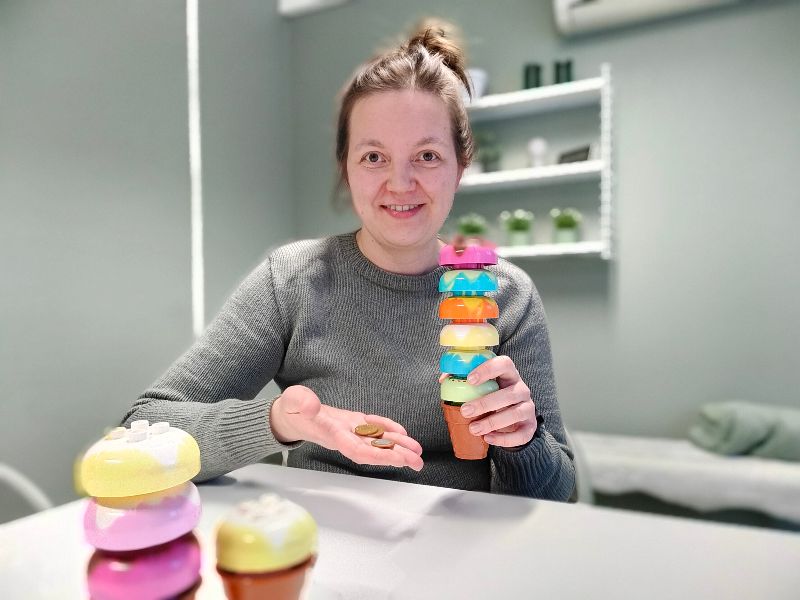Occupational therapist
"The best moments are when a client learns a skill or activity that they have been practising for a long time. I also love the little successes and fun moments with my clients."

- Suvi Tervahauta
- Works as an occupational therapist at Toimivax Oy.
- Completed an occupational therapist degree at Oulu University of Applied Sciences.
- 10 years of work experience in the field.
Briefly explain what you do for a living.
I work as an occupational therapist in a company that provides occupational therapy services. Most of my clients who come for a series of occupational therapy sessions have a payment commitment granted by the public sector or an insurance company.
The purpose of the therapy period is to reinforce the client’s ability to function in their daily life. In the case of a child, the aim is to help their school attendance, for example by improving the child’s ability to concentrate or fine motor skills. With a young person or an adult client, the goal may be to reinforce the client’s personal identity or their ability to work or study. Occupational therapy may also entail practising how to manage social situations or take care of yourself or your home. The work also includes cooperation with parents, teachers, counsellors or assistants.
How have you ended up in the profession of your choice?
I became interested in the job already as a child as I watched an occupational therapist at work with a close relative. I found it fascinating how the ability to function can be improved through everyday things, like play, arts and crafts or baking.
Describe your typical working day or week.
Most of my therapy sessions take place in clients’ homes or at schools. In the morning, I stop by at the office to pick up the tools I need. I then go to meet my customers. In the afternoon, I am usually at the office. I enter my therapy sessions in the patient data system, plan and arrange upcoming meetings, stay in touch with clients' support networks and record feedback regarding previous therapy periods. I also take part in meetings and training days.
What kind of work environment or working hours do you have?
I have my own workstation where I perform my written work and keep my things. Therapy meetings take place in clients’ homes or at day-care centres and schools. I work weekdays from 8 to 4.
What kind of competence or qualities are required in the profession?
To do this job, you need qualifications and a right granted by Valvira to practise the profession. An occupational therapist needs good interaction and organisational skills, a methodical nature and the ability to tolerate stress.
What is the best thing about your profession?
The best moments are when a client learns a skill or activity that they have been practising for a long time. I also love the little successes and fun moments with my clients. My colleagues are really important to me and I love being able to share tips and ideas with them. It adds to my passion for the job.
What are the downsides of the profession or what seems challenging?
As the work requires travel from one place to another, it involves a lot of scheduling. At times, coordinating the schedules of clients and partners can be challenging. Working with people can sometimes land you in stressful situations. Work counselling helps me process them.
What would you tell a person considering the profession of an occupational therapist?
I would recommend the job of occupational therapist to anyone who enjoys working independently with people. What is more, this job provides you with the opportunity to work at many different workplaces. I enjoy the diversity of my job as well as working at different locations. In this profession, you also have the option to do outpatient work at a hospital or health centre where patients come to see the therapist.
How do you see the future of your profession?
For me, the future of my profession looks bright. Occupational therapy can reinforce people’s ability to function and work as well as help with school attendance or living at home. These are important things, both for individuals and society at large.
